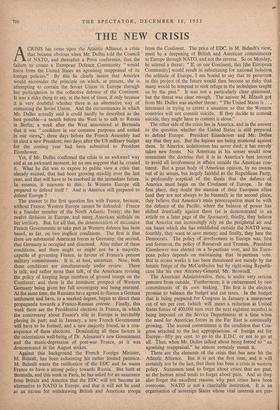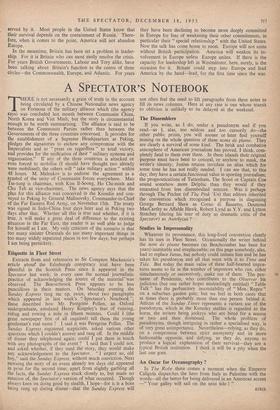THE NEW CRISIS
ACRISIS has come upon the Atlantic Alliance, a crisis that became obvious when Mr. Dulles told the Council of NATO, and thereafter a Press conference, that the failure to create a European Defence Community " would force from the United States an agonising reappraisal of its foreign policies." By this he clearly meant that America would reconsider the principle on which, at present, she is attempting to contain the Soviet Union in Europe through her participation in the collective defence of the Continent. It was a risky thing to say, at the best of times, if only because it is very doubtful whether there is an alternative way of containing the Soviet Union. And the circumstances in which Mr. Dulles actually said it could hardly be described as - the best possible—a month before the West is to talk to Russia in Berlin; a week after the West announced at Bermuda that it was " confident in our common purposes and united in our views","; three days before the French Assembly had to elect a new President; two days after the US military budget for the coming year had been submitted to President Eisenhower.
Yet, if Mr. Dulles confirmed the crisis in an awkward way and at an awkward moment, let no one suppose that he created it. What he did was to expose to public view a crisis that already existed, that had been growing steadily over the last year, and that will have to be resolved in the immediate future.
In essence, it amounts to this : Is Western Europe still prepared to defend itself ? And is America still prepared to defend Europe ?
The answer to'the first question lies with France, because, without France, Western Europe cannot be defended. France is a founder member of the North Atlantic Treaty; she has twelve divisions in Europe, and many American airfields on her territory. But, for all that, the determination of successive French Governments to take part in Western defence has been based, so far, on two implicit conditions. The first is that there are substantial American forces in Germany; the second, that Germany is occupied and disarmed. Alter either of these conditions, and there might or might not be a majority, capable of governing France, in favour of France's present military commitments. It is, at best, uncertain. Now, both these conditions are simultaneously under review. There is talk, and rather more than talk, of the Americans revising the policy of keeping large numbers of ground troops on the Continent; and there is the imminent prospect of Western Germany being given her full sovereignty and being rearmed.
At the same time, the Russians have agreed to discuss a German settlement and have, to a marked degree, begun to direct their propaganda towards a Franco-Russian entente. Finally, this week there are the Presidential elections in France, in which the controversy about France's role in Europe is inevitably playing its part; and in January, a new French Government will have to be formed, and a new majority found, as a con- sequence of these elections. Dominating all these factors is the ostentatious well-being of Dr. Adenauer's new Government and the manic-depression of post-war France, as it was demonstrated in the August strikes.
Against this background the French Foreign Minister, M. Bidault, has been exhausting his rather limited patience.
M. Bidault wants the ratification of the EDC and he wants France to have a strong policy towards Russia. But both .at Bermuda, and this week in Paris, he has asked for an assurance from Britain and America that the EDC will not become an alternative to NATO in Europe, and that it will not be used as an excuse for withdrawing British and American troops from the Continent. The price of EDC, in M. Bidault's view, must be a deepening of British and American commitments to Europe through NATO, and not the reverse. So on Monday, he uttered a threat : " If, on our Continent, this [the European Community] would result in substituting for national isolation the solitude of Europe, I am bound to say that to persevere in this project of the future would then become so risky that many would be tempted to seek refuge in the techniques taught us by the past." It was not a particularly clearktatement, but the threat was clear enough. The answer M. Bidault got from Mr. Dulles was another threat: " The United States is . interested in trying to create a situation so that the Western countries will not commit suicide. If they decide to commit suicide, they might have to commit it alone."
The other side of the crisis lies in America, and in the answer to the question whether the United States is still prepared to defend Europe. President Eisenhower and Mr. Dulles say that they are. But the legions are being mustered against them. In America, isolationism has never died; it has merely taken new forms. No American in his senses would now resuscitate the doctrine that it is in America's best interest to avoid all involvement, in affairs outside the American con- tinent. But a great body of American opinion, by no means out of its senses, but largely faithful to the Republican Party, is profoundly sceptical of the thesis that the defence of America must begin on the Continent of Europe. In the first place, they doubt the stamina of their European allies (and they are not always to be blamed); in the second place, they believe that America's main preoccupation must be with the defence of the Pacific, where the balance of power has shifted drastically against them (as is demonstrated in an article on a later page of the Spectator); thirdly, they believe that America can increasingly rely on the peripheral air and sea bases which she has established outside the NATO area; fourthly, they want to save money; and finally, they hate the Democrats. The policy of involvement in Europe was, first and foremost, the policy of Roosevelt and Truman. . President Eisenhower was elected on a bi-partisan vote, and his Euro- pean policy depends on maintaining that bi-partisan vote. But in recent weeks it has been threatened not merely by the lunatic fringe of the McCarthyites but by right-wing Republi- cans like his own Attorney-General, Mr. Brownell.
The American Administration, then, is under very serious pressure from outside. Furthermore, it is embarrassed by two commitments of its own making. The first is the election promise to balance the budget and cut taxes. In the budget that is being prepared for Congress in January a manpower cut of ten per cent. (which will mean a reduction in United States forces of 400,000 men over the next eighteen months) is being imposed on the Service Departments at a time when the need for American forces in the Far East is continually growing. The second commitment is the condition that Con- gress attached to the last appropriations of foreign aid for Europe—fifty per cent. to go to the E.D.C. or not to go at all. Thus, when Mr. Dulles talked about being forced to " an agonising reappraisal," he almost certainly meant it.
These are the elements of the crisis that has now hit the Atlantic Alliance. But it is not the first time, and it will certainly not be the last, that there has been a crisis in western policy. Statesmen tend to forget about crises that are past, as the human mind tends to forget about pain. And .so they also forget the excellent reasons why past crises have been overcome. NATO is not a charitable institution. It is an organisation of sovereign States whose vital interests are pre- served by it. Most people in the United States know that their survival depends on the containment of Russia. There- fore, when it comes to the point, America will not abandon Europe.
In the meantime, Britain has been set a problem in leader- ship. For it is Britain who can most easily resolve the crisis. For years British Governments, Labour and Tory alike, have been talking about Britain's function as the centre of three circles—the Commonwealth, Europe, and Atlantic. For years they have been declining to become more deeply committed in Europe for fear of weakening their other commitments, in particular their " special relationship " with the United States. Now the talk has come home to roost. Europe will not unite without British participation. America will weaken its in- volvement in Europe unless Europe unites. if there is the capacity for leadership left in Westminster, here, surely, is the occasion for it. Britain could step into Europe and lead America by the hand—lead, for the first time since the war.











































 Previous page
Previous page